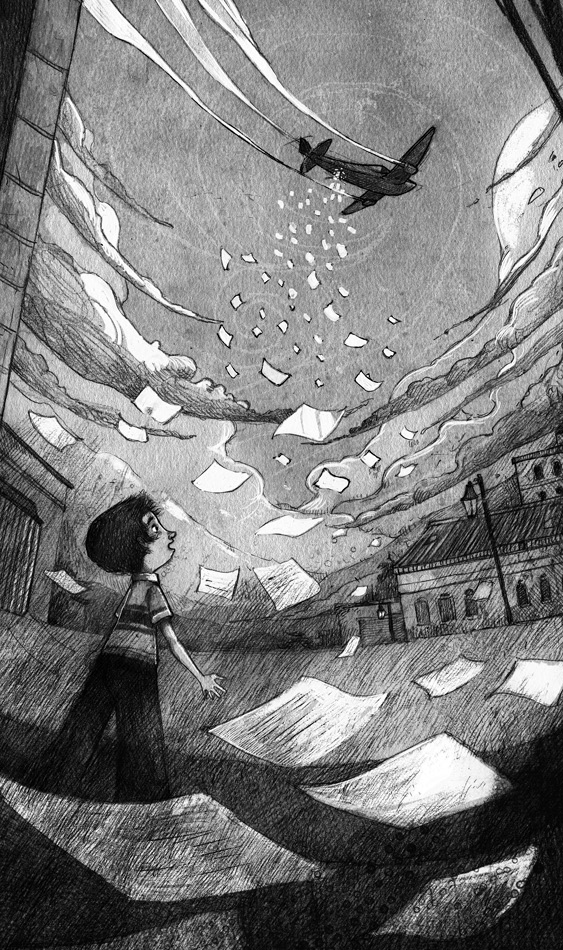
3
Papers Raining from the Sky
•
The week after Augusto plays his dirty trick on me, Consuelo takes me with her to buy tortillas at the corner store. I hear lots of airplanes flying low overhead.
Suddenly, yellow and blue papers rain down from the sky, twisting and spinning in the air. They land on the sidewalk and street like flying saucers.
On our way back, I pick up several sheets of paper to show my father.
He is reading the newspaper, sitting in one of the fluffy chairs in the dining room.
“What is it, Davico?”
“Airplanes dropped these pretty papers on the sidewalk.”
Papá takes off his reading glasses and pronounces the words aloud very slowly. His face becomes angrier and angrier the more words he reads. He mutters words like guns, armies and tanks, which I know from my comics. But now the words make me shiver.
When he has finished reading, he rips the sheets of paper into dozens of pieces.
“What is it, Papá?”
“Trouble,” he says. And he shakes his head.
I know the words on the paper have made him angry. I understand some of them, but many, like liberación and revolución, I really don’t.
“What kind of trouble?”
“These flyers are warning us of trouble to come. Dirty politics.”
“What’s dirty politics?”
My father runs a hand through his hair. It is beginning to thin and turn silvery.
“Davico, I came to Guatemala from Germany to escape this nonsense.”
“What nonsense?”
He smiles at me. “It’s too complicated to explain to you.”
“No, it’s not! I am learning to add and subtract numbers in school. I can read some chapter books. Señorita Elisa says I am very smart.”
My father stands up and hugs me. He hardly ever touches me. Maybe these colored papers aren’t so bad.
While he is hugging me, I tell him, “Felipe also tells me lots of interesting things. The other day he told me that the Mayans built giant temples in the jungle.”
My father stops hugging me and looks away, scratching at his knuckles. “It’s nothing for you to worry about.”
He pulls me by the hand and we go out into the courtyard. He looks up into the air. More papers are flying down. His face darkens.
Suddenly he shouts, “Why can’t people leave us alone?” And he goes off by himself into the house.
I stay in the courtyard and pick up the papers. Maybe Felipe can explain the big words to me later.
For now, I try to figure out what is bothering Papá. A few days ago, we heard loud sirens going off and then some shooting. Mamá said it was probably just some older kids throwing firecrackers. But I know what firecrackers sound like.
And these were not the sounds of firecrackers.
The restaurant is almost always empty at night now. I am sure it has to do with the colored papers that came flying down. All I can think is that people are afraid to go out.
One night the electricity goes out after the last customers leave. Mamá lights some big stumpy candles. Papá locks the big wooden door and puts the metal latch across the front.
Sirens are screaming. Maybe a fire truck is racing to a fire, or a police car is hurrying to an accident.
But then we hear people running down the street, and the sound of guns and rifles going off.
I am very scared. Even Felipe looks frightened. Our parents hug us as we eat warm tortillas, black beans and cheese under the dining-room table.
There is nothing more we can do. We huddle together and listen to the government radio station for news.
The sirens? I know they hurt my ears and don’t come from police cars or ambulances.
This goes on for several nights in a row.
“What are we going to do?” asks Mamá on the third night as we sit under the largest dining-room table. “The president says that these blackouts are necessary because soldiers are planning to invade Guatemala City and take control.”
Papá shrugs. He has got real good at shrugging. “That’s what the flyers said.”
“The flyers I found on the street?” I ask.
In the candlelight, my father’s face looks like a ghost.
“Yes,” he sighs.
Felipe pipes in. “The president is turning off the electricity so that the invaders won’t bomb his palace. I would do the same thing.”
“Is Felipe right?” I ask.
My mother taps my leg to tell me to quiet down. Then she says, “We have to do something, Luis. We can’t just sit here and wait. Soon we will have to close up the restaurant for good.”
Papá shrugs. “Well, at least people can still come for lunch.”
“Just our friends who work in the hotels and stores nearby. And the newspaper reporters from the United States. They never order more than a sandwich and a beer,” my mother says, rolling her eyes. “If these blackouts continue, we’ll have to throw out the beef and chicken in the freezer.”
“I know that,” Papá says sharply.
“Luis, please. Don’t raise your voice at me —”
For a second, there is silence. I hate it when my parents fight. I look at Felipe. He just turns away.
“Are you going to have to close the restaurant?” I ask.
Felipe snaps back at me. “The restaurant is finished.”
I wonder if Consuelo is safe. I worry about the lobsters. They would all die if a bullet were to fly in and hit the glass tank.
“Yes, yes. I’m sorry, Fortuna. We have to do something,” Papá says. He hugs my mamá. She runs her hand through his hair, and my father smiles his tiny crooked smile.
This makes me happy.
I have the feeling that everything will be okay.
•